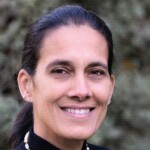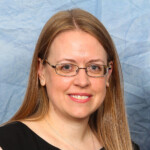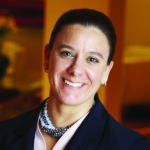Voting is open February 1-28 for Cornell alumni to elect two new members to the Cornell University Board of Trustees. Four candidates are endorsed by the Committee on Alumni Trustee Nominations: John Balen ’82, MBA ’86; Liv Gussing Burgess ’91; A’ndrea Van Schoick ’96; and Kim Wagner ’85.
We asked the candidates to share more about their Cornell experiences.
 John Balen ’82, MBA ’86
John Balen ’82, MBA ’86
What inspired you to choose Cornell?
As an undergraduate, I wanted to be an electrical engineer, but I also desired to broaden my academic experience outside engineering. As the largest Ivy, Cornell not only offered a world-class engineering curriculum but a wide spectrum of top-tier courses across the university. Unlike many other engineering programs, Cornell clearly provided the best academic breadth and depth. It was an exciting opportunity to take courses from so many renowned professors. In addition, I was also a fervent hockey player and fan, so having a nationally ranked Division 1 men’s hockey team was an added benefit.
When it came time to pursue my MBA, Cornell was at the top of my list. I was fortunate to have taken an MBA course as an undergraduate and was familiar with the program. Cornell had many prominent professors, and it was just the right size. As a graduate student, developing a good relationship with both my professors and classmates was important and I did not want to be just another student learning from a teaching assistant. I truly enjoyed my experience and many of my classmates remain close friends.
What one person or class influenced you most during your time as a student?
My Cornell experience was broad and influential in many ways, so it is hard to choose just one person or class. As an engineering co-op student, I had the opportunity to take a computer architecture design class from Professor H.C. Torng. He was an inspirational professor and compelling instructor, and he developed numerous computer architecture innovations. He demanded tremendous discipline and accountability while encouraging creativity. The class was also fundamental in developing my core knowledge of modern computer architecture and systems, which I have used to this day.
Outside of class, what was your favorite part of your Cornell experience?
My fraternity, Sigma Nu, provided me with a multitude of friendships and experiences that have lasted a lifetime. I became friends with people from around the world pursuing degrees from virtually every college at Cornell. We learned to live, work, play, and socialize together. We played in a variety of intramural sports—including my favorite, ice hockey—as well as encouraging our friends on various Cornell teams and clubs. Sleeping outside for Cornell hockey tickets and attending the games, especially against Harvard, was particularly memorable. We supported each other throughout our Cornell experience, and it was so useful to have upper-level students readily available for advice. It was a lot of fun and a great counterbalance to the daily academic rigor.
What motivates you to serve as a volunteer?
Volunteering provides me an avenue to follow my passions while giving back to the community. As a first-generation college graduate, I am particularly passionate about the power of education and entrepreneurship, which are both indelibly ingrained into my life. They are such instrumental forces. A great education can be a true equalizer for people, regardless of their background. Knowledge provides enlightenment and power. Entrepreneurship is about successfully creating and managing sustainable change into a system. Taking risks and making positive changes move our society forward. By volunteering with other Cornellians, I hope to leverage my time and experience to help Cornell successfully move forward for future generations.
 Liv Gussing Burgess ’91
Liv Gussing Burgess ’91
What inspired you to choose Cornell?
Growing up in Switzerland, I was aware of hospitality management as a career and familiar with numerous Swiss hotel schools, many of which had world-class reputations. I was attracted to Cornell’s Hotel School because it provided a more rounded education in leadership, business, and hotel operations.
The Hotel School’s bespoke curriculum within a larger world-class academic institution was not only appealing, but seemed ideal. While I was focused on hospitality, I relished the opportunity to explore and challenge myself in other areas, including foreign languages, literature, and philosophy.
Finally, Cornell’s land-grant status and commitment to public engagement was the icing on the cake. I was confident that through the Cornell community, I would be introduced to a diverse student body with distinct perspectives and passions. Thus, I was resolute in my choice, completed one college application, and committed to venture across the Atlantic Ocean and enroll at Cornell University.
What one person or class influenced you the most during your time as a student?
Hotel Ezra Cornell (HEC) played an integral role in my academic experience at Cornell. The weekend-long conference for hospitality leaders and alumni is orchestrated, managed, and executed by students. My involvement spanned four years of volunteering and leadership, including managing the main banquet for one thousand guests in Barton Hall and being elected by the student body as Managing Director of HEC ’66.
The student Board of Directors attends a weekly leadership class that echoes Ezra Cornell’s vision of applying knowledge and expertise to solve real-world problems. The class was a capstone that involved strategic planning, problem solving, dialogue, and debate. Perhaps what impressed me most was the collaboration and commitment of the collective faculty to mentor and inspire us.
HEC taught me about the power of a shared vision, teamwork, creativity, responsibility, and accountability. I also learned valuable lessons from mistakes and consequences. When I return to campus to attend HEC as a participant, I am always heartened by this shared experience.
Outside of class, what was your favorite part of your Cornell experience?
The many people I met along the way enriched my Cornell experience: in the classroom, through the residence halls, when working at Cornell dining, within Greek life and socially, as a teaching assistant, in extra-curricular organizations, and through Hotel Ezra Cornell. I met talented and inspiring individuals who taught me something new, encouraged me to appreciate a different perspective, offered kindness, or simply made me laugh.
My participation in a wide range of classes, clubs, and activities (Cornell had so many to offer) allowed me to meet myriad individuals that I would not otherwise have encountered. That was the magic of Cornell. And the more that I explored—a sporting event, concert, foreign film, or guest speaker—the more I learned from those around me. That breadth and depth of students is such a testament to Cornell’s “…any person… any study.”
What motivates you to serve as a volunteer?
In the 1920s, the Hotel School became a reality through benefactor E.M. Statler. His words, “Life is service,” are memorialized on a plaque at the entrance to Statler Hall. The quote is longer, but those first three words sum up why I volunteer.
I am tremendously grateful for the opportunity that I had to attend Cornell University. It is my privilege to give back. My four years on campus shaped my life, both personally and professionally, and subsequently created numerous opportunities. I therefore wish to give back to the organization that has had such a lasting impact.
I also volunteer because it allows me to spend time with other passionate individuals with whom I share a common past bond and a future vision to strengthen Cornell for the next generation. I have built invaluable friendships around the world through volunteering, which motivate and inspire me.
Finally, I strongly believe that education—and more specifically an institution like Cornell—is vital to educating our youth, creating knowledge, and solving the most challenging problems in the world.
 A’ndrea Van Schoick ’96
A’ndrea Van Schoick ’96
What inspired you to choose Cornell?
Although I cannot pinpoint the exact moment, I had wanted to attend Cornell for as long as I can remember. Growing up in New Jersey, I saw many proud alumni and parents; the name was everywhere—on bumper stickers, sweatshirts, and hats. My goal was to become a veterinarian, and many I worked with had attended Cornell and offered only glowing reports. A friend of mine was an animal science major in CALS while I was in high school, and I visited her during Cornell Days. The beauty of the campus, the facilities, and the experience I had attending classes with her were amazing. Even the weather was lovely (well-played, Ithaca!). I loved that I could earn a solid technical background in my major, including practical large animal experience, while also pursuing other academic interests like music, literature, and Spanish. Coming from a graduating class of 33 students, I appreciated the concept of smaller colleges and majors within a large university, making the Cornell universe more welcoming. There were also a couple of very enthusiastic local alumni who kept in touch throughout the application process, and I noted their love of the school. I knew there must be something special about this place.
What one person or class influenced you most during your time as a student?
As a second-semester, first-year student, I hit the hallways of Cornell Vet with my resume in hand. After receiving a few “we are not hiring” responses, I knocked on the door of a PhD student in Dr. Wayne Schwark’s laboratory. She took a chance on an undergraduate looking for a work-study job in veterinary medicine. Dr. Lauren Trepanier, already a Cornell DVM, was whip-smart, driven, and well-respected. I felt an immediate kinship with her and looked up to her as an employer, mentor, and friend. To this day, I try to organize and approach my work the way she did. Dr. Trepanier introduced me to a whole new world within veterinary medicine, in research and pharmacology. I worked with her for several years in the Therapeutic Drug Monitoring Program at the New York State Diagnostic Laboratory, including research on a retrospective study, which eventually led to a publication. I will be forever grateful to her for opening my eyes to options in the veterinary field outside of traditional clinical practice, leading me to a career I love that balances regulatory and clinical medicine. I channel this experience when I talk with current students and colleagues about career opportunities.
Outside of class, what was your favorite part of your Cornell experience?
I spent a lot of time in Mann and Uris Libraries as an undergraduate. My outside activities provided balance at a time when I would have found it very easy to hibernate in those terrific libraries, studying non-stop for four years. In that balance, I found some of my favorite Cornell experiences. There was nothing like belting out the stress of a long week in song on Friday evenings in Sage Chapel with the Chorale. Leading tours and participating in panels for the CALS Ambassadors helped me come out of my shell a bit, and I got to learn more about CALS and Cornell. Tours also helped get me outdoors to enjoy more of the beautiful campus that I love visiting to this day. As an only child, I was thrilled to find a family of so many brothers and sisters when I was invited to pledge Alpha Zeta Fraternity. Late-night study groups (with Wegman’s trips for sustenance), house dinners and “must-see TV” on Thursday nights, planning “Cow Chip Bingo” on the Ag Quad and the annual Haunted House; the “AZ kids” made some great memories together and are forever in my life and in my heart.
What motivates you to serve as a volunteer?
My Cornell experience has meant so much to me that I want to do my part to create an equally meaningful and unique opportunity for others. By giving my time to Cornell, I find myself receiving so much more in return. Serving as part of a community I believe in, enjoying the work, and knowing that I can make a difference—what a special treat! Beyond my desire to give back in service to Cornell’s mission, my “why” is the people I have met on this journey. My ongoing involvement with Cornell activities has introduced me to life-long friends and acquaintances I would never have had the opportunity to meet otherwise—alumni, students, faculty, and staff. They have taught me so much about myself and others, not only in my four years on campus, but also in the twenty-five years since my graduation. These connections have exposed me to new points of view, challenged me to develop new skills, and dared me to look at the world in different ways. They have shown me how complex and wonderful the Cornell community is, and yet how small and interdependent our world is. My life is all the richer for it!
 Kim Wagner ’85
Kim Wagner ’85
What inspired you to choose Cornell?
I grew up in the suburbs of Long Island, but my great-grandparents were farmers and one of my uncles returned to farming in the Hudson Valley as a second career. As far back as I can remember, I knew that one day I would be involved in agriculture. By the time I was in high school, I had my heart set on becoming a large animal veterinarian. My parents didn’t graduate from college, but my mother instilled in me the importance of a good education and in planning ahead. When I learned that CALS and the New York State College of Veterinary Medicine were both at Cornell University, my high-school brain couldn’t even imagine there was another option. I applied early decision to CALS and the rest is history.
What one person/class influenced you most during your time as a student?
Being an undergraduate at Cornell was such a transformational experience for me. I can honestly say that I was influenced in one way or another by every person and every class. I was like a sponge, soaking up everything I could as fast as I could. There was one class, Fundamentals of Endocrinology, taught by Dr. Butler in the Department of Animal Science, that forever changed the trajectory of my career. Through this class, in one semester, all of my previous coursework came crashing together into what felt like an intuitive understanding of biology—from chemistry at the molecular level, all the way through to whole animal physiology. More importantly, I realized that there were more ‘unknowns’ than ‘knowns’ when it came to biology and medicine. That realization, along with some difficult conversations with trusted faculty members, led me to set aside my childhood dream of going to vet school to pursue graduate school instead.
Outside of class, what was your favorite part of your Cornell experience?
One of my fondest memories of Cornell was my very first day on campus. I didn’t have a chance to visit campus before move-in day, and I will never forget the army of red-shirted friendly people that unpacked the car and swooped me into my dorm room faster than I was able to comprehend what was going on. For all intents and purposes, it was my introduction to the people of Cornell. Outside of class, my favorite part of Cornell was and still is the people. Where else on this planet could you have an interesting conversation with any and every person? I never would have predicted that one of the students I met my first year on the second floor of Donlon Hall would eventually become my husband and business partner (in that order)! Many of my closest friends are people I met as a student or over the years as a Cornell volunteer. It’s probably worth noting that my first volunteer experience at Cornell was as one of those red-shirted Orientation Counselors the next fall, and every fall while I was a student.
What motivates you to serve as a volunteer?
I have always believed in helping out and giving back. The ‘growing up’ I did while an undergraduate at Cornell forever changed my life, and for this, I am eternally grateful. From the opportunities it created to the confidence that it instilled, many of my successes trace back to my Cornell experience. In a world where time is often the limiting resource, I focus my efforts in ways that have the potential to generate significant and lasting impacts. This is why many of my volunteer activities over the years have in some way involved Cornell—at the local level with Cornell Cooperative Extension, at the college level with the CALS Advisory Council, and university wide with the Atkinson Center for Sustainability and Cornell Council. Expanding my volunteer service to include being an alumni trustee would create additional opportunities to contribute and build the institution that has done so much for me.


